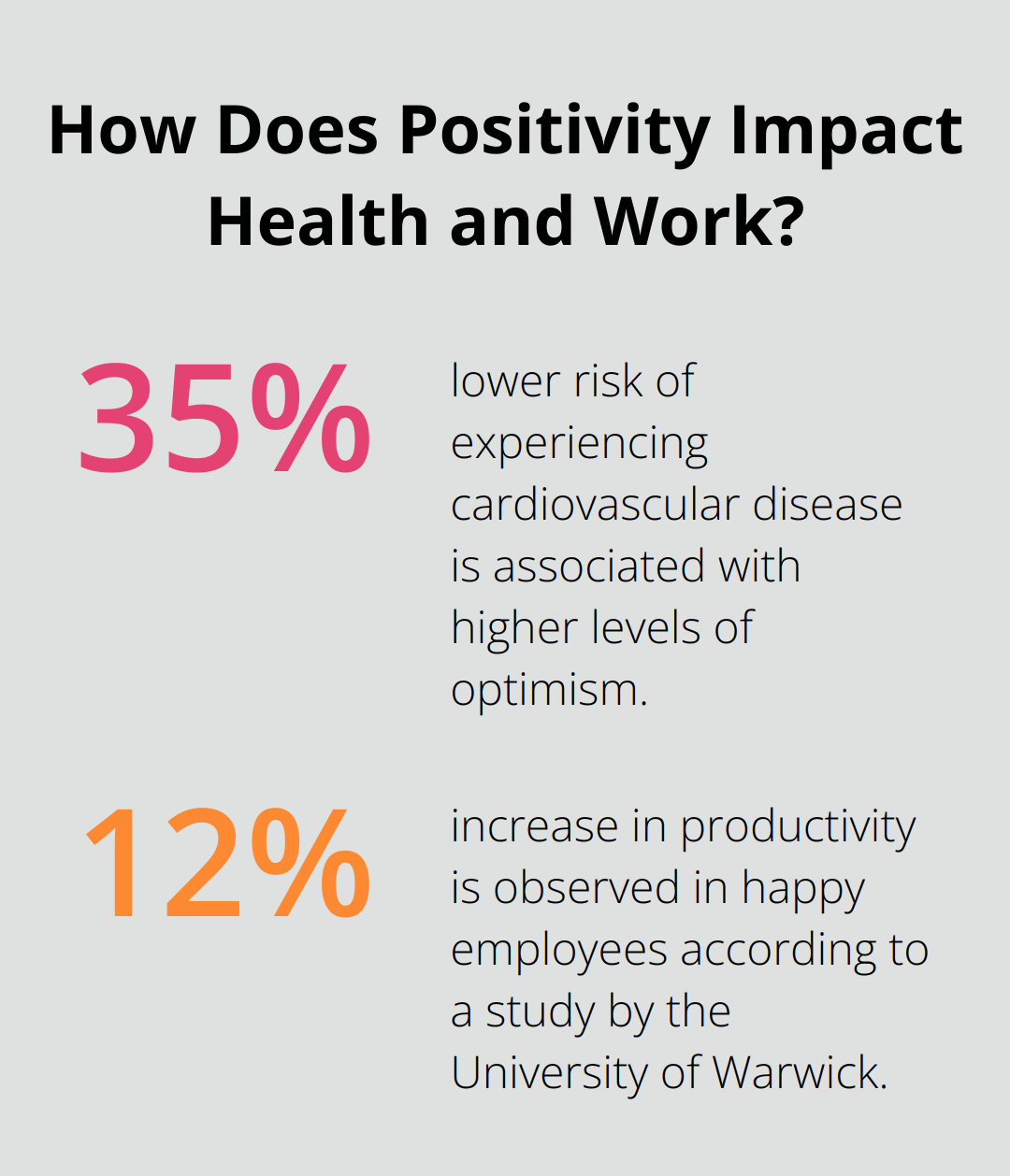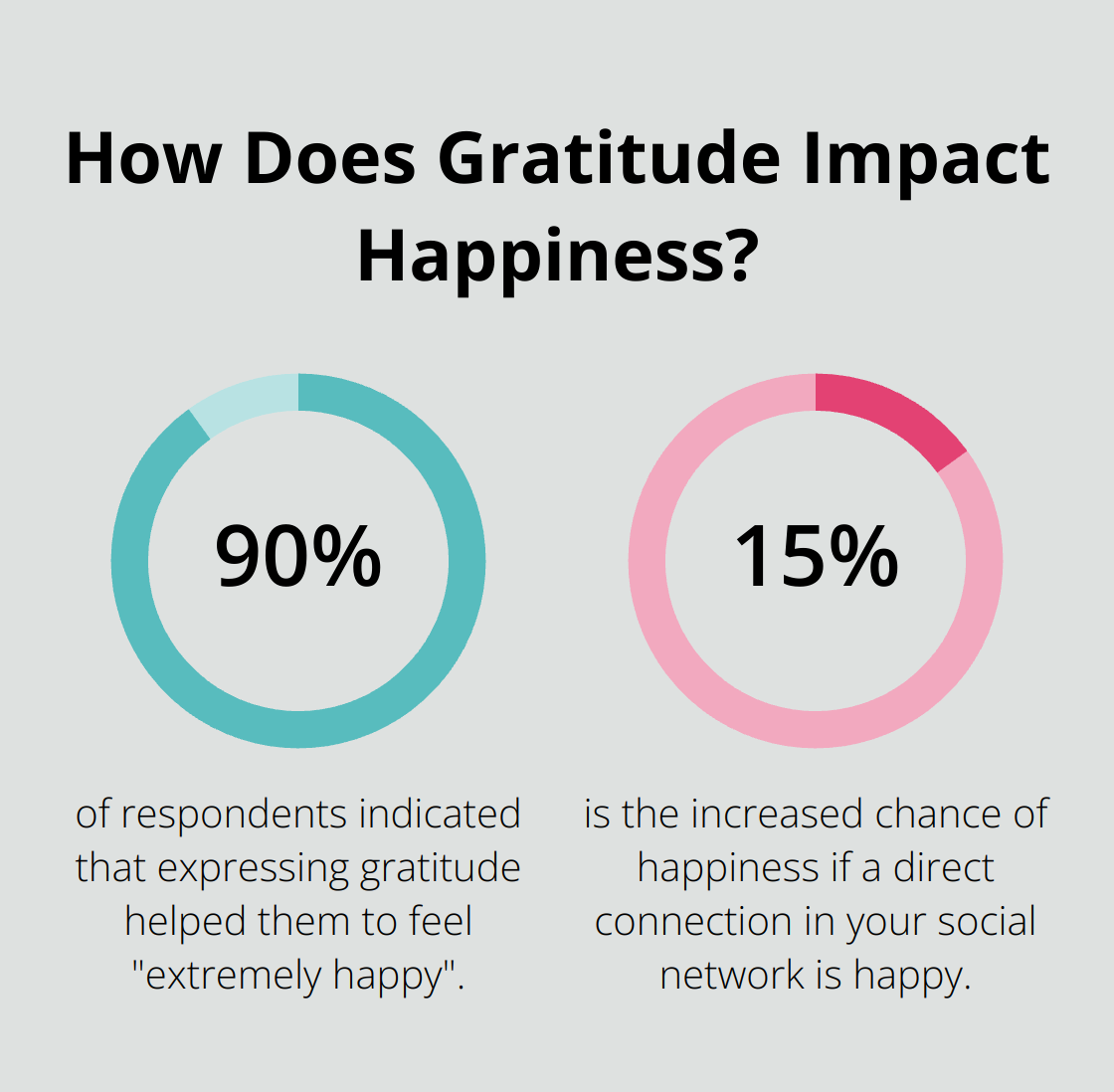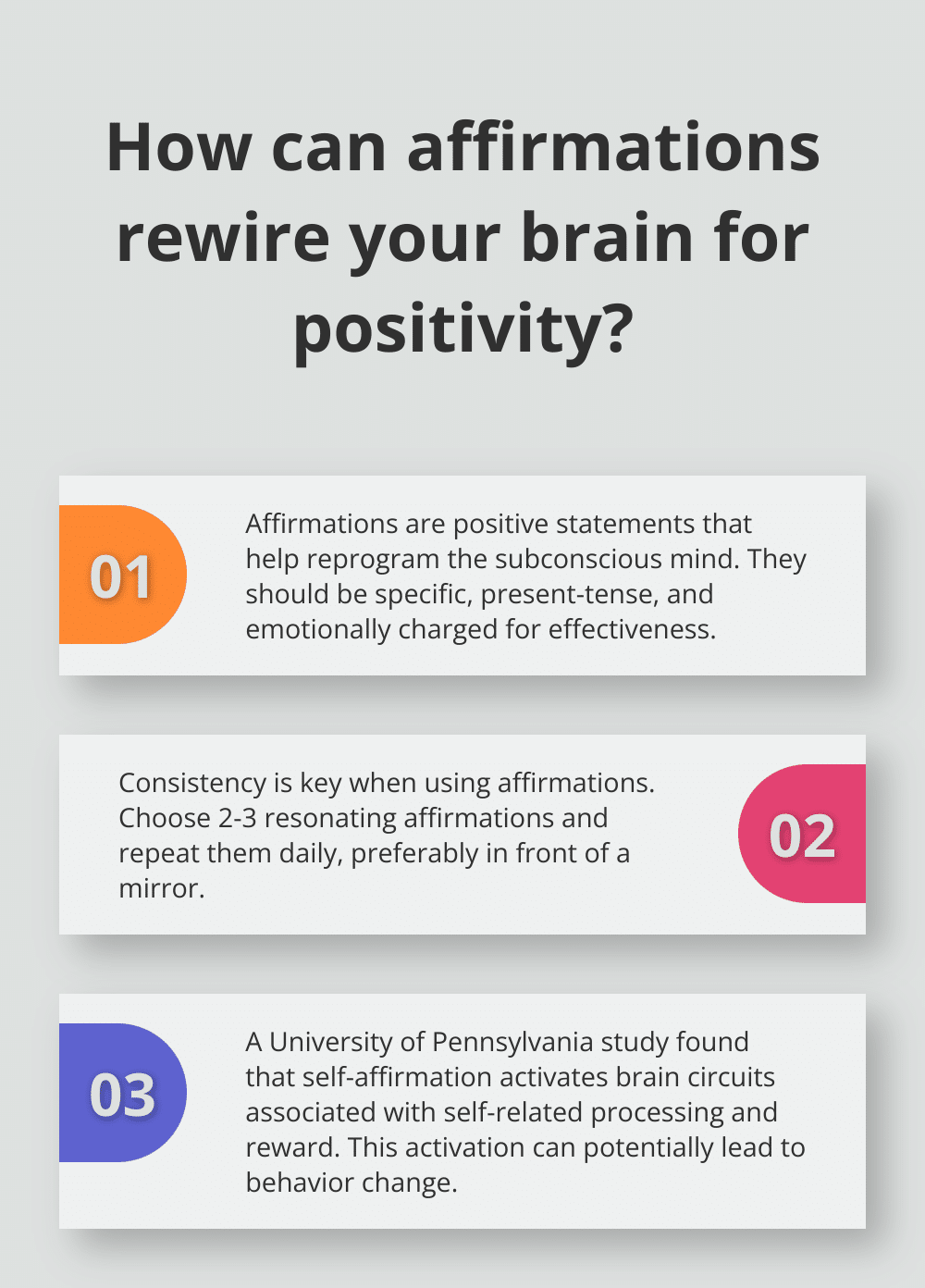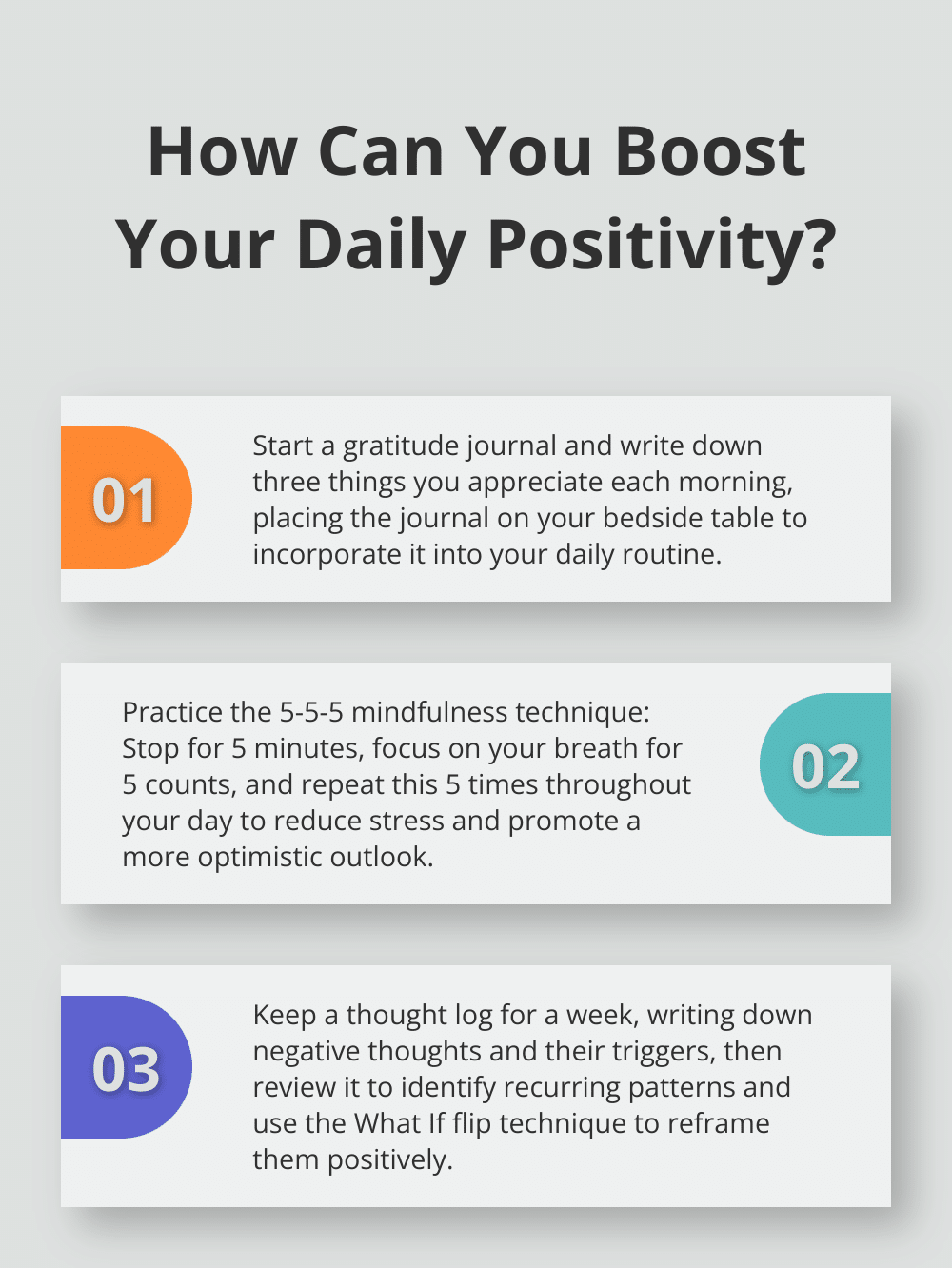At Global Positive News Network, we believe in the transformative power of positivity. In a world often dominated by negative headlines, cultivating a positive mindset can be a game-changer for your well-being and success.
This blog post offers practical tips on how to be positive in your daily life. We’ll explore science-backed strategies, from gratitude journaling to mindfulness, that can help you overcome negativity and embrace a more optimistic outlook.
Why Positive Thinking Matters
The Science of Optimism
Positive thinking isn’t just a feel-good concept; it’s a powerful tool that can reshape your life. Research reveals that those who viewed aging as a positive experience lived, on average, 7.5 years longer than those who took a darker view. This isn’t just about living longer; it’s about living better. When you think positively, your brain releases neurotransmitters like serotonin and dopamine (associated with happiness and well-being). These chemicals not only make you feel good but also help combat stress and anxiety.
Physical Health Benefits
The mind-body connection is real, and positive thinking has tangible effects on your physical health. Studies found that individuals with higher levels of optimism have a 35% lower risk of experiencing cardiovascular disease. Additionally, positive thinkers tend to have stronger immune systems, lower blood pressure, and better pain tolerance. These benefits highlight the importance of cultivating a positive mindset for overall well-being.
Relationships and Success
Positivity is contagious. When you approach life with optimism, you’re more likely to attract like-minded individuals. This can lead to stronger, more supportive relationships. In the workplace, a study by the University of Warwick found that happy employees are 12% more productive. This increased productivity can lead to greater success in your career and personal projects.
Practical Steps to Positivity
Implementing positive thinking in your daily life doesn’t have to be complicated. Try to identify one good thing that happened each day. Over time, this practice can rewire your brain to focus more on the positive aspects of your life, leading to a more optimistic outlook overall.

Positivity isn’t about ignoring life’s challenges. It’s about approaching those challenges with a constructive mindset. This approach will equip you to handle stress, build resilience, and find creative solutions to problems.
As we move forward, let’s explore practical strategies that can help you cultivate positivity in your everyday life. These techniques will provide you with concrete tools to harness the power of positive thinking and transform your outlook.
How to Boost Positivity in Your Daily Life
Cultivating positivity requires consistent effort and practical strategies. This chapter explores effective methods to enhance your daily positivity quotient.
Gratitude Journaling: A Powerful Practice
Start your day by writing down three things you appreciate. This simple act can transform your brain’s focus towards life’s positive aspects. A study by Emmons found that over 90% of respondents indicated that expressing gratitude helped them to feel “extremely happy”. To establish this habit, place your journal on your bedside table and incorporate it into your morning routine.
Mindfulness: Embrace the Present
Integrating mindfulness into your daily life can significantly reduce stress and boost positivity. Research suggests that practicing meditation may reduce blood pressure, anxiety and depression. Try the 5-5-5 technique: Stop for 5 minutes, focus on your breath for 5 counts, and repeat this 5 times throughout your day. This straightforward practice can center your thoughts and promote a more optimistic outlook.
Curate Your Social Circle and Media Intake
The people and information you surround yourself with profoundly impact your mindset. A Journal of Experimental Psychology study found that exposure to negative news can increase anxiety and sadness. Take control of your media consumption by following positive news sources (Global Positive News Network stands out as a top choice). Additionally, spend time with friends who uplift you. Research indicates that happiness can spread through social networks, increasing your chances of happiness by 15% if a direct connection is happy.
Acts of Kindness: Give and Receive
Performing acts of kindness benefits others and boosts your own happiness. A study in the Journal of Social Psychology found that participants who performed kind acts for seven days experienced a significant increase in happiness levels. Try small actions: hold the door for someone, compliment a coworker, or volunteer for a local charity. These actions create a positive feedback loop, enhancing your mood and the mood of those around you.
Positive Self-Talk: Reframe Your Inner Dialogue
The way you talk to yourself significantly influences your overall outlook. Replace negative self-talk with positive affirmations. For example, instead of saying “I can’t do this,” try “I’m learning and improving every day.” This shift in internal dialogue can boost your confidence and resilience (studies show that positive self-talk can reduce anxiety and improve performance in various areas of life).

As you implement these strategies, you’ll notice a gradual shift in your perspective. The next chapter will explore how to overcome negativity bias, a common obstacle in maintaining a positive mindset.
Rewiring Your Brain for Positivity
Spotting Negative Thought Patterns
The first step to overcome negativity bias requires you to recognize when it occurs. Negative thought patterns, or cognitive distortions, can manifest as incorrect assumptions, unrealistic self-criticisms, and even the denial of reality itself. Identification of these patterns allows you to challenge and change them.

A practical exercise involves keeping a thought log for a week. Write down any negative thoughts you notice, along with the situation that triggered them. At the end of the week, review your log to identify recurring patterns. This awareness forms the foundation for change.
Reframing Techniques
After you identify negative thought patterns, you need to reframe them. This doesn’t mean ignoring problems, but rather approaching them from a more balanced perspective. For example, if you make a mistake at work, instead of thinking “I’m terrible at my job,” try “I made a mistake, but I can learn from this and improve.”
A powerful reframing technique is the “What If” flip. When you catch yourself thinking “What if something bad happens?”, flip it to “What if something good happens?” This simple shift can open your mind to positive possibilities.
Building Resilience Through Self-Talk
Your internal dialogue shapes your reality. Positive self-talk doesn’t involve unrealistic optimism, but treats yourself with the same kindness you’d offer a friend. When faced with a challenge, ask yourself, “What would I say to a friend in this situation?” Then apply that supportive language to yourself.
A study published in the Journal of Personality and Social Psychology found that people who practice self-compassion have greater emotional resilience and handle life’s challenges better. Start by replacing harsh self-criticism with encouraging statements. Instead of “I can’t do this,” try “This is difficult, but I’m capable of figuring it out.”
Harnessing the Power of Affirmations
Affirmations are positive statements that can help reprogram your subconscious mind. To use affirmations effectively, make them specific, present-tense, and emotionally charged. For instance, instead of a vague “I am happy,” try “I feel joy and gratitude for the abundance in my life.”
Consistency proves key with affirmations. Choose 2-3 that resonate with you and repeat them daily (preferably in front of a mirror). A study by the University of Pennsylvania found that self-affirmation can activate brain circuits associated with self-related processing and reward, potentially leading to behavior change.
These techniques, when practiced consistently, can gradually shift your mindset towards positivity, creating a ripple effect that enhances all aspects of your life.
Final Thoughts
A positive mindset serves as a powerful tool for personal growth and well-being. We discussed various tips on how to be positive, including gratitude journaling, mindfulness practices, and surrounding yourself with uplifting influences. These practical steps can transform your daily life and outlook.

The long-term benefits of maintaining positivity are profound. Improved physical health, stronger relationships, increased resilience, and success in various aspects of life all stem from a positive perspective. Consistent effort and practice yield rewards that far outweigh the initial investment of time and energy.
We encourage you to start implementing these positive practices today. Global Positive News Network supports your journey towards a more positive life with uplifting news and stories. Your path to a more optimistic outlook begins now, and every small step forward deserves celebration.




